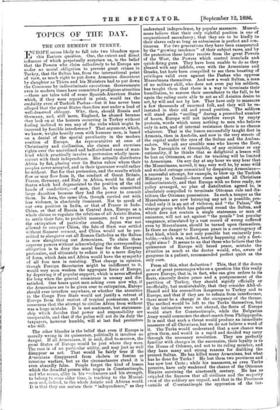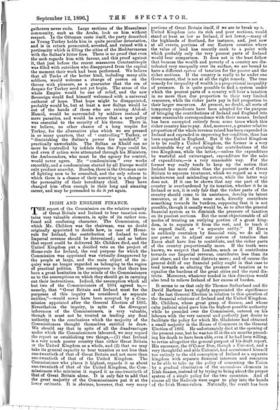TOPICS OF THE DAY.
THE ONE REMEDY IN TURKEY.
EUROPE seems likely to fall into two blunders upon this Eastern question. One, the extent and direct influence of which perpetually surprises us, is the belief that the Powers who claim collectively to be Europe are under no moral obligation to prevent great crimes in Turkey, that the Sultan has, from the international point of view, as much right to put down Armenian discontent by slaughter as Thiers and his Ministers had to put down the Commune by indiscriminate executions. Governments even in modern times have committed prodigious atrocities —there are tales told of some Spanish-American States which, if they were repeated in print, would tax the credulity even of Turkish Pashas—but it has never been alleged that the great States therefore rest under a load of well-deserved obloquy. Why, then, should Russia and Germany, and, still more, England, be abused because 1 hey look on at the horrors occurring in Turkey without feeling inclined to run any of the risks which might be incurred by forcible interference ? That argument, which, we know, weighs heavily even with humane men, is based on a denial of the special peculiarity in the modern position of Europe. As representative at once of Christianity and civilisation, she claims and exercises rights over the uncivilised and half-civilised races of man- kind which practically involve a pretension wholly incon- sistent with their independence. Sbe actually distributes Africa by fiat, placing over its States rulers whom their peoples never accepted, and in their ignorance would rather be without. But for that pretension, and the results which flow or may flow from it, the conduct of Great Britain, France, Germany, and Italy in Africa, would be that of States which had degenerated to the position of the old bands of condottieri,—of men, that is, who committed large dacoities because they had the power to commit them. In Asia, the same idea, though carried out with less violence, is absolutely dominant. Not to speak of our own position in India, or that of France in Indo- China, or that of Russia in Central Asia, Europe as a whole claims to regulate the relations of all Asiatic States, to settle their fate, to prohibit massacre, and to prevent the extirpation of particular creeds. Japan was not allowed to conquer China, the fate of Siam was settled without Siamese consent, and China would not be per- mitted to slaughter out all Roman Catholics as the Sultan is now slaughtering out Armenians. To claim these supreme powers without acknowledging the corresponding obligation is to deny the moral base for the European pretension, and ultimately to reduce it to a mere display of force, which Asia and Africa would have the sympathy of all free men in resisting. That change in opinion, though Foreign Secretaries might be indifferent to it, would very soon weaken the aggregate force of Europe, by depriving it of popular support, which is never afforded for long when the general conscience is uneasy and dis- satisfied. One hears quiet men asking even now why, if the Armenians are to be given over to extirpation, Europe should ever interfere anywhere, or whether the atrocities in the Congo Free State would not justify a retreat of Europe from that vastest of tropical possessions, and a consensus that the attempt to civilise Africa from without was a huge mistake. It is not sentiment, but statesman- ship which decides that power and responsibility are inseparable, and that if the police will not do its duty the taxpayers, however humble, will at last find protectors who will.
The other blunder is the belief that even if Europe is morally wrong in its quiescence, politically it involves no danger. If all Armenians, it is said, died to-morrow, the great States of Europe would be just where they were. The race is of no particular utility, and may just as well disappear as not. That would be fairly true if the Annenians disappeared from cholera or famine or intestine warfare, but as the circumstances stand it is even absurdly false. People forget the kind of lesson which the dreadful person who reigns in Constantinople, and who seems, alike in his '-caknesses and his strength, to belong to some older time, is teaching to the Massul- man and, indeed, to the whole Asiatic and African world. It is that they can restore their " independence," as they understand independence, by popular massacre. Mussul- mans believe that their only rightful position is one of unquestioned ascendancy; that they are to be kindly to. their slaves only so long as submission is perfect and con- tinuous. For two generations they have been exasperated by the "growing insolence" of their subject races, and by the protection these latter receive from the great Powers of the West, the Powers which control ironclads and quick-firing guns. They have been unable to do as they pleased with any infidels, even with the Armenians and Greeks, but have been compelled to see them boasting of privileges valid even against the Pashas who oppress. Mussulmans themselves. And now a weak Sultan, a man of no military skill, who does not even pay his soldiers, has taught them that there is a way to terminate their humiliation, to restore their ascendancy to the full, to be again the ruling caste able to act as all Asiatics desire to act, by will and not by law. They have only to massacre a few thousands of unarmed folk, and they will be re- instated in their old and proud position. The soldiers. will stand aside " smiling " during a prescribed number of hours, Europe will not interfere except by empty protests, words which mean nothing to men who believe only in acts, and of internal resistance there is no chance whatever. That is the lesson successfully taught first in Armenia, then in Anatolia, and now in the very streets of the capital under the eyes of the Sultan and the Ambas- sadors. We ask any sensible man who knows the East,. be he Turcophile or Grecophile, of any opinions or any nationality, if he thinks that so delightful a lesson will be lost on Ottomans, or that its teaching will be limited to Armenians. On any day at any hour we may hear that. the Mussulmans, moved, it may very well be, by some wild and wicked outrage committed by despairing Armenians— a successful attempt, for example, to blow up the Turkish Ministry in Council—have risen against all Christians indiscriminately, and that Europe with no force ready, no policy arranged, no plan of distribution agreed to, is absolutely compelled to terminate Ottoman rule and dis- tribute the Ottoman possessions. In such a temper as the Mussulmans are now betraying any act is possible, pro- vided only it is an act of violence, and "the Palace," the strange group which has gathered round the Sultan, and which does not contain a single statesman or man of eminence, will not act against " the people " lest popular vengeance, stimulated by a vast record of wrong suffered even by Mussulmans, should be turned upon themselves. Is there no danger to European peace in a contingency of that kind, which is not only possible but eminently pro- bable,—which was, indeed, nearly happening only a fort- night since ? It seems to us that those who believe that the quiescence of Europe will breed peace, mistake the situation as much as the doctor would, who, aware of gangrene in a patient, recommended perfect quiet as the only cure.
From all this, what deduction ? This, that if the dozen or so of great personages who on a question like this really govern Europe, that is, in fact, who can give orders to its fleets, sincerely desire peace and a postponement of the partition of Turkey, they should signify officially or unofficially, but unmistakably, that they consider Abd-ul- Hamid and his counsellors dangerous to Turkey and to Europe, and that if they are to refrain from interference, there must be a change in the occupancy of the throne. The method would be left to the Turks themselves, but if the intimation were not obeyed, the fleets of Europe would start for Constantinople, while the Bulgarian Army would commence the short march from Philippopolis. It is said that such a threat would produce an immediate massacre of all Christians, but we do not believe a word of it. The Turks would understand that a new chance was given them, and would in a rapid and decided way carry through the necessary revolution. They are perfectly familiar with changes in the succession, their loyalty is to the House of ()Oman, and not to its ruling member, and they have many and strong reasons for disliking the present Sultan. He has killed many Armenians, but what has he done for Turks ? He lost them two provinces and , has now lost Crete ; while his massacres, as even Turks perceive, have only weakened the chance of the Ottoman Empire surviving the nineteenth century. He has so crippled the finances that all civilians and the majority even of the soldiery are unpaid, and that in the Provinces outside of Constantinople the oppression of the tax- gatherers never ends. Large sections of the Mussulman community, such as the Arabs, look on him without respect. In the Ottoman caste itself, the party described as Young Turkey holds him in quite peculiar detestation, and is in return persecuted, arrested, and ruined with a pertinacity which is filling the cities of the Mediterranean with the Sultan's bitter foes. There is no proof that even the mob regards him with favour, and this proof against it, that just before the recent massacres Constantinople was filled with outsiders who disappeared from the capital the moment their work had been performed. We believe that all Turks of the better kind, including many able soldiers, would welcome a change of person on the throne with pleasure, as a guarantee that the era of despair for Turkey need not yet begin. The sense of the whole Empire would be one of relief, and the new Sovereign would find himself welcomed with a universal outburst of hope. That hope might be disappointed, probably would be, but at least a new Sultan would be out of the hands of those who are ruining Abd-ul- Hamid, would be surrounded by soldiers instead of mere parasites, and would be aware that a new policy was essential to the security of his throne. There is, we believe, no other chance of a long respite for Turkey, for the alternative plan which we see pressed in so many quarters, that of ' controlling" Turkey, or " diminishing the Sultan's power for mischief," is practically unworkable. The Sultan as Khalif can no more be controlled by infidels than the Pope could be, and even if action were attempted through his Ministers, the Ambassadors, who must be the agency for control, would never agree. No " condominium " ever works smoothly, and a condominium started by all Europe would only produce anarchy. Besides, there is the Ottoman caste of fighting men to be consulted, and the only reform to which there is a chance of their assenting is a change in the personality of their hereditary chief. They have changed him often enough in their long and amazing career, and may be persuaded to do it yet again.



































 Previous page
Previous page